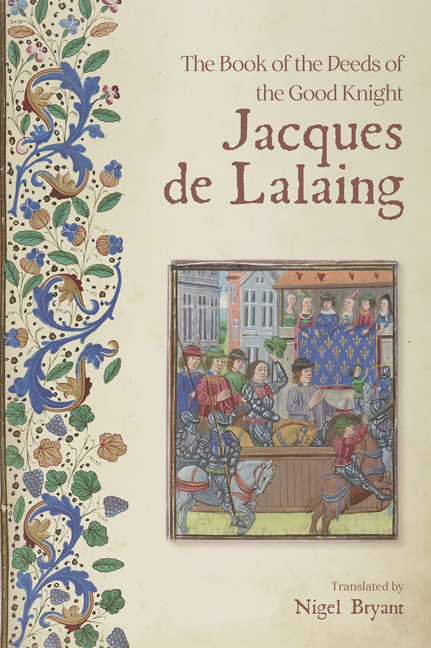Summary
Authorship
‘My most honoured lord, I am sending you … certain recollections of the high and admirable deeds of arms performed in the lists by your late son Sir Jacques de Lalaing … and ask you to forgive me for not presenting them in fuller and better form … But they are small memories in relation to the greatness of his deeds, and [the herald] Charolais, who witnessed the majority of his noble exploits, has written of them at length, and can write still more along with other noble persons who can speak of them. With the gathering of such writings I hope that you, my most honoured and redoubted lord, will have books made, so that those who have issued – and will in future issue – from the noble house of his birth take his high and noble deeds as an example … [I hope, too, that] the one who comes to write of Sir Jacques's illustrious, chivalrous deeds can recover something from this letter which I, Golden-Fleece, have written … for they are well worthy of record.’
This is an extract from a letter by Jehan Lefèvre de Saint-Remy – otherwise known as ‘Golden-Fleece’, King of Arms of the Burgundian order of chivalry, the Order of the Toison d’Or – written to Jacques's father following the young knight's dramatic death, of which more anon. It is a letter of surprising length, full of heartfelt admiration – and, one senses, affection – for Jacques, and contains detailed, eyewitness accounts of many of his most memorable exploits. Given Lefèvre's status and reputation for integrity, it leaves little reason to doubt that Jacques de Lalaing was a genuinely exceptional knight, fit to be memorialised as an object of outstanding pride for Burgundy, and indeed a model of ideal knighthood. Moreover, the letter gives such clear indications of how The Book of the Deeds of Jacques de Lalaing came to be written that it is more than a little strange that there should have been for a long while doubts and confusion about its authorship.
In short, the first (17th-century) edition attributed The Book of the Deeds to the Burgundian chronicler Georges Chastellain, on the flimsiest of bases that the writer's name which appears at the very end – in the last line of the verse epitaph for Jacques – is ‘Jorge’.
- Type
- Chapter
- Information
- Publisher: Boydell & BrewerPrint publication year: 2024



